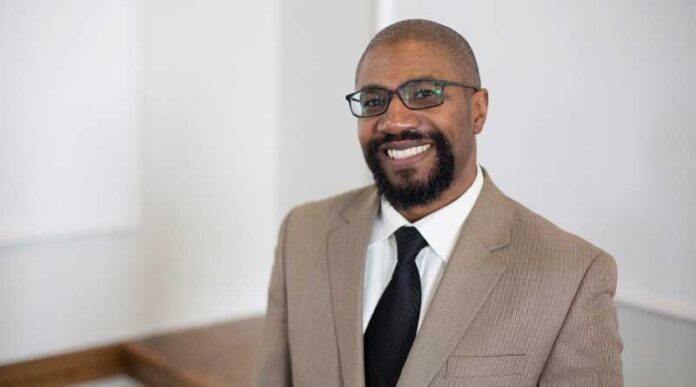By Salma Ghalwash
Born in Harlem in New York City, Dr. Eric De Barros, an English professor, studied at one of the largest high schools with some of the most distinguished alumni in the city. After his undergraduate studies at the University of Virginia, he completed his master’s and Ph.D. at the University of Illinois. He received a few fellowships, including one fellowship to teach and study at Colgate University. Two years ago, he started teaching at the American University of Sharjah.
Where did you start your career?
I got my first full-time position with more long-term potential at Clark University in Worcester, Massachusetts. After four years, I left for the University of the West Indies in Trinidad and Tobago. While a wonderful opportunity to teach in a country with a diverse student population, the relocation abroad wasn’t right for my family at the time. And so I came back to the States after one year. After two years at Old Dominion University in Norfolk, Virginia, I decided I wanted to try teaching abroad again. I applied for this position and now I’m here.
Why did you choose AUS?
My early formative years in New York were characterized by an incredibly diverse environment. When I was looking at my current position, one of the most attractive things was how diverse AUS is. I felt it might give me an opportunity to capture something like my formative experiences in New York.
Did you face any difficulties teaching here?
The challenge has been adjusting to certain conventions that don’t necessarily support a discussion-oriented approach to learning. For the past four semester, I have worked to tweak my pedagogy to meet the needs of my students and am really pleased with the willingness of students to try different approaches to their learning.
What is the most defining moment in your academic journey?
In college, that’s when I realized that things that I took for granted weren’t necessarily represented and if I wanted them, I would have to seek them out. I really pushed for those things like inclusion and diversity, but what struck me was the possibility of taking education in the humanities seriously as a career option. My initial plan was to do something practical, whether it was pre-law or pre-med, and then go on to become a doctor or a lawyer.
Why did you decide to pursue literary studies instead?
I was struck by the seriousness with which my instructors in literature courses took the field. To witness someone seriously engaged in complex thought processes right in front of me, was magical. I decided within the first year of my education that I wanted to do that for a living.
How were your experiences in literature courses magical?
It wasn’t magical in an idealistic, pleasure-oriented way. It was magical in terms of the power of complex thought.
Why should we study Shakespeare?
It’s in the complexity of Shakespearean expression to understand, evaluate and strategize positive change in our world as it’s shaping us and as we’re navigating it. If we discipline ourselves to critically evaluate through literary analysis, we can transfer skills to any issue that we are confronting. That is the rationale for “Shakespeare for Today,” to use Shakespeare.
What inspired “Shakespeare for Today?”
I conceptualized “Shakespeare for Today” to illustrate the relevance of literary studies. If we look at Shakespeare as presenting us with his various plays and poems – they’re interpretive problems. If we engage in a process of figuring out those plays in ways that are meaningful to us, then we can apply those skills to the real world, to real-world issues. There’s a crisis in higher education with dropping enrollment in literature courses. I was talking to a colleague. She shared with me a program that they started at Montclair State University. They were facing the same crisis that most humanity programs are facing and decided to have a monthly event, “Philosophy for Lunch.” It was so successful. I was thinking that maybe I could develop and tweak the idea for Shakespeare.
Why was it successful?
There’s an element of community building in what we do. People want to have those conversations about those difficult, complex issues.
When did you start holding meetings for “Shakespeare for Today?”
I conceptualized it when I was in Trinidad, but I wasn’t there long enough to test it. By the time I arrived at my next institution, COVID hit. There wasn’t an opportunity to test it as a physical gathering. But I worked with one dedicated student there to hold the gatherings online. Once I got here, I wasn’t going to waste time. I identified potentially interested students, encouraged them to talk about a few passages of literature and to think about how it helps us understand the world that we’re inheriting.
How has the turnout been so far?
So far, so good. We’ve had attendance from 40 to about 60 students. I’m very pleased with the interest and dedication of students who meet weekly to have conversations about the play that we’re talking about.
What prompts you to analyze and apply Shakespeare to real life?
It’s not just about demonstrating my ability to analyze text. There’s always the question, “so what?” How is this going to make a difference in the life of anyone I care about? By understanding these issues, I help to bring awareness for my students or people that I just care about. And that’s why I’ll be presenting at a conference in a couple of weeks.
Where will you be presenting?
At the Shakespeare Association of America, which meets in Minneapolis, Minnesota, this year from March 29 to April 1.
What is the presentation about?
It’s about neoliberal racism in a post-pandemic Shakespeare classroom, using a personal historicist critical orientation to raise questions about what I described as our “Zoom-Flight” through the pandemic. I’m concerned with bringing awareness to those issues for the people who are the most vulnerable and least empowered: young people, children and students.
Recently, you published a chapter on “Hamlet and the Education of the White Self.” What went into writing this?
That chapter is in a collection, “White People in Shakespeare.” In that piece, I wanted to move away from thinking about race in terms of physical appearance. I wanted to think about race in terms of habits of thought. In the process, I ended up contributing a chapter arguing that Hamlet represents an early modern instance of white people defining themselves as white and therefore innocent of the “black” events—Western imperialism, slavery, and colonization—that continue to empower them. The chapter itself is a reflection of the theories that generally inform my scholarship, which I describe as the politics of embodied subjectivity. Race is just one of the ways in which we’re embodied. I also look at all of the various ways in which we are embodied and consider them to assess questions of identity.


















